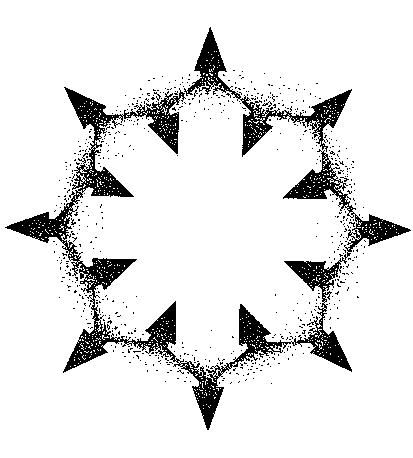In another article we looked at how Russians could have accessed Witkoff’s phone and how naive he was to use Signal for secure discussions while in Moscow. But it doesn’t make sense that the Russian sponsored hackers would add Goldberg to the group, exposing the vulnerability that these unsecured discussions represented. They would have wanted to milk the Trump administration for intel and not reveal the vulnerability. This raises the possibility that “white hat” hackers, who had the best interests of the US, and the lives of their military and intel personnel, added Goldberg to the group to expose and end the vulnerability.
To explore how and why Ukrainian hackers, members of Anonymous, or some other party might have infiltrated a government Signal chain to add Jeffrey Goldberg and expose off-channel discussions of top-secret military plans, let’s break this down systematically. The scenario involves a real incident where Jeffrey Goldberg, editor-in-chief of The Atlantic, was accidentally added to a Signal group chat discussing U.S. military strikes on Houthi targets in Yemen, as reported on March 24, 2025. The question posits a deliberate infiltration rather than an accident, so we’ll analyze the potential methods, motives, and actors involved.
How Could This Infiltration Have Happened?
- Social Engineering and Phishing Attacks:
- Ukrainian hackers or Anonymous could have used social engineering to trick a U.S. official into adding Goldberg to the Signal chat. For instance, they might have impersonated a trusted contact, such as a member of the National Security Council (NSC), to send a connection request to Goldberg. In the actual incident, Goldberg received a Signal connection request from a user identified as Michael Waltz, the U.S. National Security Adviser, on March 11, 2025. A hacker could have spoofed Waltz’s identity by creating a Signal account mimicking his name or credentials, exploiting the app’s lack of robust identity verification.
- Alternatively, they could have targeted Waltz or another official with a phishing attack to gain access to their Signal account. The Pentagon issued a warning on March 18, 2025, about a vulnerability in Signal, citing risks from “Russian professional hacking groups” attempting to spy on encrypted communications. While this warning focused on Russian actors, Ukrainian hackers or Anonymous could have exploited similar vulnerabilities, such as phishing campaigns, to compromise an official’s device and manipulate the chat.
- Device Compromise:
- If hackers gained access to an official’s phone—through malware, a compromised app, or physical access—they could have directly added Goldberg to the chat. Signal, while end-to-end encrypted, does not protect against vulnerabilities on the device itself. For example, a keylogger or remote access tool could have allowed hackers to control Waltz’s Signal app, sending the connection request and adding Goldberg to the “Houthi PC small group” chat on March 13, 2025.
- Insider Collaboration or Rogue Actor:
- Another possibility is that an insider within the U.S. government, sympathetic to Ukraine or Anonymous’ goals, deliberately added Goldberg to the chat to expose the discussions. This insider could have been recruited by Ukrainian hackers or acted independently, motivated by ideological alignment or discontent with the Trump administration’s policies. The chat included high-profile figures like Vice President JD Vance and Defense Secretary Pete Hegseth, making it a prime target for someone seeking to leak sensitive information.
- Exploitation of Signal’s Group Chat Mechanics:
- Signal allows group admins to add members without requiring approval from all participants, which could be exploited if a hacker gained admin privileges. If Waltz’s account was compromised, the hacker could have added Goldberg without other members noticing, as Goldberg reported that no one seemed aware of his presence in the chat. Signal’s disappearing messages feature, which Waltz used (set to delete after one week), might have also delayed detection of the breach.
Why Would They Do This?
- Ukrainian Hackers’ Motives:
- Geopolitical Strategy: Ukrainian hackers, such as those in groups like Stand for Ukraine or Squad 303, have a history of targeting entities perceived as threats to Ukraine, especially since Russia’s invasion in 2022. The U.S. strikes on the Houthis, an Iranian-backed group, could have been seen as indirectly benefiting Iran’s adversaries, including Russia, which has ties to Iran. Ukraine might have wanted to disrupt U.S. military operations in Yemen to shift focus back to their own conflict with Russia, where they urgently need Western support. Exposing U.S. war plans could pressure the Trump administration to reconsider its Middle East strategy, potentially redirecting resources to Ukraine.
- Information Warfare: Ukraine has used cyber operations to influence global narratives, as seen with Squad 303’s efforts to send millions of text messages to Russian citizens to counter Kremlin propaganda. By adding Goldberg, a prominent journalist, to the chat, Ukrainian hackers could ensure the exposure of U.S. operational security (OPSEC) failures, embarrassing the Trump administration and possibly eroding trust in its national security apparatus. This aligns with Ukraine’s broader strategy of leveraging media to gain international support.
- Anonymous’ Motives:
- Anti-Authoritarian Ideology: Anonymous, a decentralized hacktivist collective, has a long history of targeting governments and institutions they view as misusing power. Since Russia’s invasion of Ukraine, Anonymous has conducted operations like “OpRussia,” hacking Russian websites and leaking data to support Ukraine. Exposing U.S. war plans on a commercial app like Signal could be a way to highlight what they see as reckless behavior by the Trump administration, especially given the potential violations of the Espionage Act and federal records laws noted by experts.
- Support for Ukraine: Anonymous has explicitly aligned with Ukraine, as seen in their 2022 hacks of Russian state media and infrastructure. They might have orchestrated the Signal breach to indirectly aid Ukraine by drawing attention to U.S. military actions that could distract from Ukraine’s needs. For instance, Vice President Vance’s comments in the chat about the strikes benefiting European trade more than U.S. interests could be used to fuel narratives that the U.S. is neglecting Ukraine’s plight.
- Other Parties’ Motives:
- Russian Intelligence: While the question focuses on Ukrainian hackers and Anonymous, Russia cannot be ruled out. The Pentagon’s warning about Russian hacking groups targeting Signal suggests they have the capability and interest. Russia might have orchestrated the breach to sow chaos in U.S. national security operations, especially since the Houthi strikes targeted an Iranian ally, and Russia has strategic ties with Iran. Adding Goldberg could amplify the leak, creating a public relations disaster for the U.S. and potentially straining its alliances.
- Domestic Actors: A U.S.-based actor, such as a disgruntled official or a hacktivist group opposed to Trump’s policies, might have acted to expose the administration’s mishandling of classified information. Democrats like House Minority Leader Hakeem Jeffries and Rep. Eric Swalwell criticized the incident as a national security breach, suggesting domestic political motives to undermine Trump’s credibility.
Why Jeffrey Goldberg Specifically?
- High-Profile Target for Maximum Impact: Goldberg, as editor-in-chief of The Atlantic, is a well-known journalist with a history of reporting on national security issues. His inclusion ensures that the leak would gain significant media attention, as it did when he published his article on March 24, 2025. Ukrainian hackers or Anonymous might have chosen him to maximize the exposure of the Trump administration’s OPSEC failures.
- Potential Mistaken Identity Exploit: The incident might have exploited a case of mistaken identity. Goldberg speculated that Waltz might have intended to add Jamieson Greer, the U.S. Trade Representative, who shares the same initials (JG). Hackers could have manipulated contact lists or Signal profiles to make Goldberg appear as the intended recipient, leveraging the confusion.
Critical Analysis of the Narrative
The official narrative—that Goldberg’s addition was an accidental mistake by Waltz’s aide—seems plausible but raises questions. The Trump administration’s use of Signal for such sensitive discussions is already a significant lapse, as experts like Mara Karlin noted that these conversations should occur in a Sensitive Compartmentalized Information Facility (SCIF), not a commercial app. The White House’s claim that no classified information was shared is dubious, given Goldberg’s description of “operational details” about targets and weapons, which security experts like Ned Price found alarming.
However, the idea of a deliberate infiltration by Ukrainian hackers or Anonymous aligns with their capabilities and motives. Ukrainian groups have demonstrated sophisticated cyber operations, such as One Fist’s theft of 100 GB of data from a Russian weapons manufacturer in 2024. Anonymous has similarly targeted high-profile entities, as seen in their 2022 hacks of Russian TV channels. Both groups have the technical know-how to execute such an operation, especially given Signal’s known vulnerabilities to phishing and device compromise.
The timing also supports this theory. The Signal chat incident occurred amidst heightened global tensions, with Ukraine still reliant on U.S. support against Russia, and the U.S. focusing on Middle Eastern conflicts like the Houthi strikes. Exposing U.S. vulnerabilities could serve as a strategic move to refocus attention on Ukraine’s needs or to destabilize U.S. operations, indirectly benefiting Ukraine or other actors like Russia.
Conclusion
Ukrainian hackers or Anonymous could have infiltrated the Signal chain by using social engineering, device compromise, or insider collaboration to add Jeffrey Goldberg, exploiting Signal’s group chat mechanics and the Trump administration’s lax security practices. Their motives likely include disrupting U.S. military operations, exposing OPSEC failures to embarrass the administration, and advancing their geopolitical or ideological goals, such as supporting Ukraine or challenging authoritarian practices. While the official narrative points to an accident, the capabilities and incentives of these groups, combined with the broader context of cyber warfare, suggest a deliberate act is a plausible alternative explanation.


Leave a Reply